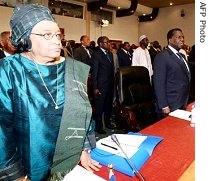2007年VOA标准英语-Liberia, Sierra Leone, Guinea Leaders Meet(在线收听)
Dakar
20 February 2007
The leaders of Liberia and Sierra Leone met in Guinea with embattled President Lansana Conte, amid concerns his forces have been trying to recruit former rebels in Liberia. The West African regional group ECOWAS is also trying to help defuse tensions in Guinea. VOA's Nico Colombant reports from our regional bureau in Dakar that Guinea union leaders are continuing a crippling and sometimes deadly strike action.

Liberian President Ellen Johnson Sirleaf attends opening session of ECOWAS summit, in Ouagadougou, Burkina Faso, 19 Jan 2007
Prior to the meeting in Conakry, Liberian President Ellen Johnson Sirleaf released a statement saying she would not tolerate Liberians being recruited as mercenaries.
One of her spokesmen said she made the trip with Sierra Leone President Ahmad Tejan Kabbah to help bring peace and reconciliation to Guinea.
The three countries are part of what is known as the Mano River Union.
In nearby Burkina Faso, a mediator for the West African group ECOWAS, Ibrahima Babanguida, met with the group's current head, Burkina Faso President Blaise Compaore, and said he was pressing on with his own efforts.
"I think as long as we engage ourselves in dialogue, there will always be a solution to the problem," he said. "We should be able to bring in the experiences of these countries to bear on our sister country so that things do not get out of hand."
A West Africa analyst with the Brussels-based International Crisis Group, Gilles Yabi, warns Mr. Conte will be difficult to deal with.
"It is difficult to have leverage especially with President Conte because he is a very eccentric [president], who is used to staying in his country, who has few diplomatic connections and who really does not care about external pressure," said Yabi.
Another analyst, who recently spent time in Guinea, Dustin Sharp, from U.S.-based Human Rights Watch, agrees, but applauds the outside effort.
"I think the stakes are too high. I think all of Guinea's neighbors and the international community in general need to take a strong interest and keep pressing," said Sharp.
Sharp says he believes Guinea, is in his words, on the brink of a precipice.
"It would not be the first time that legitimate grievances have given birth to rebel movements or other types of insurgencies," he said. "No one wants to see that happen. And it is for that very reason that we are in a very dangerous situation."
Sharp says Human Rights Watch has also been closely monitoring reports that Mr. Conte's forces are recruiting former Liberian rebels.
"According to interviews that we have done with long standing contacts in Liberia, numerous people have been approached in Liberia to be recruited in missions in Guinea. So we do not have concrete information about troop deployments or numbers, but we do believe recruitment has taken place," he said.
During Liberia's recent civil war, Mr. Conte backed the main rebel group.
Guinea is under martial law, following a round of looting by angry protesters calling for Mr. Conte to resign. He has been in power since a coup in 1984.